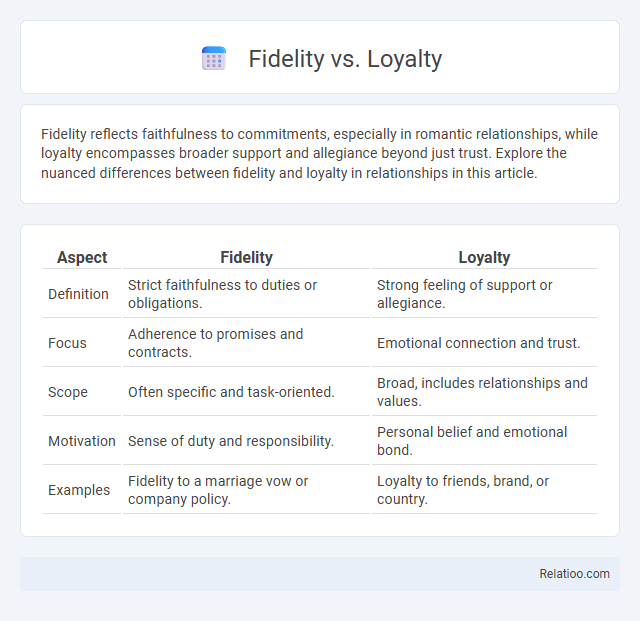Fidelity reflects faithfulness to commitments, especially in romantic relationships, while loyalty encompasses broader support and allegiance beyond just trust. Explore the nuanced differences between fidelity and loyalty in relationships in this article.
Table of Comparison
| Aspect | Fidelity | Loyalty |
|---|---|---|
| Definition | Strict faithfulness to duties or obligations. | Strong feeling of support or allegiance. |
| Focus | Adherence to promises and contracts. | Emotional connection and trust. |
| Scope | Often specific and task-oriented. | Broad, includes relationships and values. |
| Motivation | Sense of duty and responsibility. | Personal belief and emotional bond. |
| Examples | Fidelity to a marriage vow or company policy. | Loyalty to friends, brand, or country. |
Understanding Fidelity and Loyalty: Key Differences
Fidelity refers to strict adherence to promises, duties, or commitments, often emphasizing accuracy and faithfulness in relationships or responsibilities. Loyalty involves a strong feeling of support or allegiance to a person, group, or cause, highlighting emotional attachment and trust over time. Understanding these differences clarifies that fidelity centers on precise fulfillment of obligations, while loyalty is rooted in emotional bonds and consistent support.
Historical Contexts of Fidelity and Loyalty
Fidelity and loyalty have deep historical roots, with fidelity traditionally associated with faithfulness in personal relationships, often emphasized in religious and marital contexts since ancient times. Loyalty historically pertains to allegiance within social and political frameworks, such as feudal bonds between vassals and lords in medieval societies. Understanding these distinctions helps you appreciate how fidelity focuses on personal commitment, while loyalty emphasizes duty to a group or authority.
Psychological Foundations Behind Fidelity and Loyalty
Fidelity and loyalty both root in psychological frameworks of trust, commitment, and emotional attachment, yet fidelity emphasizes faithfulness to promises or vows, while loyalty reflects a steadfast allegiance to people, groups, or causes. Your understanding of fidelity involves cognitive consistency and respect for relational contracts, strengthening bonds through reliability and mutual expectations. Loyalty taps into social identity theory, where belonging and group cohesion drive your devotion, highlighting emotional resonance as a key foundation.
Fidelity vs Loyalty in Personal Relationships
Fidelity in personal relationships emphasizes faithfulness to commitments, often linked to sexual or emotional exclusivity, while loyalty revolves around unwavering support and trust even during challenges. Your ability to maintain fidelity strengthens the foundation of trust, whereas loyalty ensures ongoing dedication and protective allegiance. Understanding the nuanced differences between these values helps foster deeper intimacy and resilience in relationships.
Fidelity vs Loyalty in Workplace Environments
Fidelity in workplace environments refers to the accuracy and consistency with which employees adhere to organizational policies, standards, and ethical guidelines, ensuring reliable performance and trustworthiness. Loyalty, however, emphasizes an employee's emotional commitment and allegiance to the company's mission, culture, and leadership, fostering long-term engagement and retention. To maximize your workplace effectiveness, balancing fidelity with loyalty creates a foundation of dependable actions supported by genuine dedication to your organization's success.
Cultural Interpretations of Fidelity and Loyalty
Cultural interpretations of fidelity and loyalty vary significantly, with fidelity often emphasizing faithfulness in personal relationships, particularly within romantic and marital contexts across Western cultures. Loyalty, however, extends beyond personal bonds to include allegiance to groups, organizations, or nations, and is often celebrated in collectivist societies such as Japan and China where group harmony and duty are paramount. In some cultures, fidelity and loyalty intertwine, reflecting complex social expectations that prioritize trust and commitment differently depending on social roles and historical traditions.
Fidelity and Loyalty in Brands and Customer Behavior
Fidelity in brands refers to customers consistently choosing the same company due to trust and satisfaction, while loyalty emphasizes emotional attachment and repeat purchases. Your brand's ability to cultivate both fidelity and loyalty drives long-term customer retention and advocacy. Understanding the nuances between these concepts helps design effective marketing strategies that foster unwavering commitment and enhance customer lifetime value.
The Impact of Fidelity and Loyalty on Trust Building
Fidelity and loyalty both significantly impact trust building by fostering consistency and reliability in relationships. Fidelity emphasizes faithful adherence to commitments, while loyalty highlights unwavering support and allegiance, which together create a solid foundation for enduring trust. Your ability to demonstrate both fidelity and loyalty strengthens interpersonal bonds and promotes long-term mutual confidence.
Navigating Conflicts Between Fidelity and Loyalty
Navigating conflicts between fidelity and loyalty often requires balancing commitment to principles with allegiance to individuals or groups. Fidelity emphasizes accuracy, faithfulness, and adherence to ethical standards, while loyalty prioritizes trust and devotion to people or organizations. Understanding the context and potential consequences helps reconcile these values to maintain integrity without compromising relational bonds.
Enhancing Fidelity and Loyalty in Everyday Life
Enhancing fidelity involves consistently demonstrating reliability and trustworthiness in relationships, reinforcing a strong commitment to shared values and promises. Building loyalty requires cultivating genuine connections through empathy, active listening, and mutual support, fostering long-term bonds that withstand challenges. Integrating intentional behaviors such as open communication and accountability strengthens both fidelity and loyalty, promoting deeper trust and enduring partnerships in everyday life.

Infographic: Fidelity vs Loyalty
 relatioo.com
relatioo.com